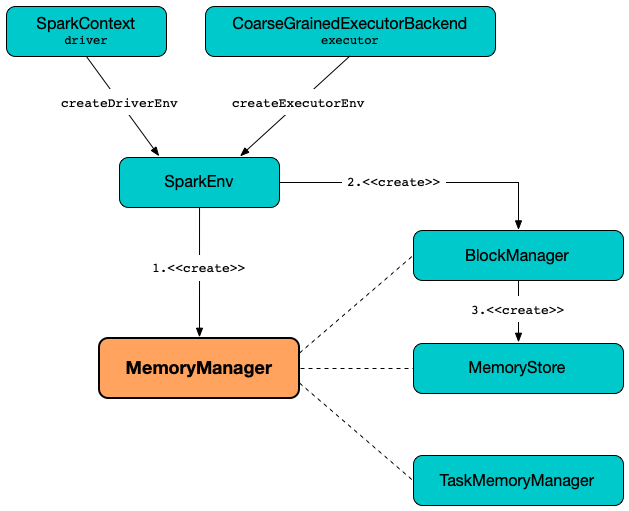MemoryManager¶
MemoryManager is an abstraction of memory managers that can share available memory between tasks (TaskMemoryManager) and storage (BlockManager).

MemoryManager splits assigned memory into two regions:
-
Execution Memory for shuffles, joins, sorts and aggregations
-
Storage Memory for caching and propagating internal data across Spark nodes (in on- and off-heap modes)
MemoryManager is used to create BlockManager (and MemoryStore) and TaskMemoryManager.
Contract¶
Acquiring Execution Memory for Task¶
acquireExecutionMemory(
numBytes: Long,
taskAttemptId: Long,
memoryMode: MemoryMode): Long
Used when:
TaskMemoryManageris requested to acquire execution memory
Acquiring Storage Memory for Block¶
acquireStorageMemory(
blockId: BlockId,
numBytes: Long,
memoryMode: MemoryMode): Boolean
Used when:
MemoryStoreis requested for the putBytes and putIterator
Acquiring Unroll Memory for Block¶
acquireUnrollMemory(
blockId: BlockId,
numBytes: Long,
memoryMode: MemoryMode): Boolean
Used when:
MemoryStoreis requested for the reserveUnrollMemoryForThisTask
Total Available Off-Heap Storage Memory¶
maxOffHeapStorageMemory: Long
May vary over time
Used when:
Total Available On-Heap Storage Memory¶
maxOnHeapStorageMemory: Long
May vary over time
Used when:
Implementations¶
Creating Instance¶
MemoryManager takes the following to be created:
- SparkConf
- Number of CPU Cores
- Size of the On-Heap Storage Memory
- Size of the On-Heap Execution Memory
Abstract Class
MemoryManager is an abstract class and cannot be created directly. It is created indirectly for the concrete MemoryManagers.
Accessing MemoryManager¶
MemoryManager is available as SparkEnv.memoryManager on the driver and executors.
import org.apache.spark.SparkEnv
val mm = SparkEnv.get.memoryManager
// MemoryManager is private[spark]
// the following won't work unless within org.apache.spark package
// import org.apache.spark.memory.MemoryManager
// assert(mm.isInstanceOf[MemoryManager])
// we have to revert to string comparision 😔
assert("UnifiedMemoryManager".equals(mm.getClass.getSimpleName))
Associating MemoryStore with Storage Memory Pools¶
setMemoryStore(
store: MemoryStore): Unit
setMemoryStore requests the on-heap and off-heap storage memory pools to use the given MemoryStore.
setMemoryStore is used when:
BlockManageris created
Execution Memory Pools¶
On-Heap¶
onHeapExecutionMemoryPool: ExecutionMemoryPool
MemoryManager creates an ExecutionMemoryPool for ON_HEAP memory mode when created and immediately requests it to incrementPoolSize to onHeapExecutionMemory.
Off-Heap¶
offHeapExecutionMemoryPool: ExecutionMemoryPool
MemoryManager creates an ExecutionMemoryPool for OFF_HEAP memory mode when created and immediately requests it to incrementPoolSize to...FIXME
Storage Memory Pools¶
On-Heap¶
onHeapStorageMemoryPool: StorageMemoryPool
MemoryManager creates a StorageMemoryPool for ON_HEAP memory mode when created and immediately requests it to incrementPoolSize to onHeapExecutionMemory.
onHeapStorageMemoryPool is requested to setMemoryStore when MemoryManager is requested to setMemoryStore.
onHeapStorageMemoryPool is requested to release memory when MemoryManager is requested to release on-heap storage memory.
onHeapStorageMemoryPool is requested to release all memory when MemoryManager is requested to release all storage memory.
onHeapStorageMemoryPool is used when:
MemoryManageris requested for the storageMemoryUsed and onHeapStorageMemoryUsedUnifiedMemoryManageris requested to acquire on-heap execution and storage memory
Off-Heap¶
offHeapStorageMemoryPool: StorageMemoryPool
MemoryManager creates a StorageMemoryPool for OFF_HEAP memory mode when created and immediately requested it to incrementPoolSize to offHeapStorageMemory.
MemoryManager requests the MemoryPools to use a given MemoryStore when requested to setMemoryStore.
MemoryManager requests the MemoryPools to release memory when requested to releaseStorageMemory.
MemoryManager requests the MemoryPools to release all memory when requested to release all storage memory.
MemoryManager requests the MemoryPools for the memoryUsed when requested for storageMemoryUsed.
offHeapStorageMemoryPool is used when:
MemoryManageris requested for the offHeapStorageMemoryUsedUnifiedMemoryManageris requested to acquire off-heap execution and storage memory
Total Storage Memory Used¶
storageMemoryUsed: Long
storageMemoryUsed is the sum of the memory used of the on-heap and off-heap storage memory pools.
storageMemoryUsed is used when:
TaskMemoryManageris requested to showMemoryUsageMemoryStoreis requested to memoryUsed
MemoryMode¶
tungstenMemoryMode: MemoryMode
tungstenMemoryMode tracks whether Tungsten memory will be allocated on the JVM heap or off-heap (using sun.misc.Unsafe).
final val
tungstenMemoryMode is a final value so initialized once when MemoryManager is created.
tungstenMemoryMode is OFF_HEAP when the following are all met:
-
spark.memory.offHeap.enabled configuration property is enabled
-
spark.memory.offHeap.size configuration property is greater than
0 -
JVM supports unaligned memory access (aka unaligned Unsafe, i.e.
sun.misc.Unsafepackage is available and the underlying system has unaligned-access capability)
Otherwise, tungstenMemoryMode is ON_HEAP.
Note
Given that spark.memory.offHeap.enabled configuration property is turned off by default and spark.memory.offHeap.size configuration property is 0 by default, Apache Spark seems to encourage using Tungsten memory allocated on the JVM heap (ON_HEAP).
tungstenMemoryMode is used when:
MemoryManageris created (and initializes the pageSizeBytes and tungstenMemoryAllocator internal properties)TaskMemoryManageris created
MemoryAllocator¶
tungstenMemoryAllocator: MemoryAllocator
MemoryManager selects the MemoryAllocator to use based on the MemoryMode.
final val
tungstenMemoryAllocator is a final value so initialized once when MemoryManager is created.
| MemoryMode | MemoryAllocator |
|---|---|
ON_HEAP | HeapMemoryAllocator |
OFF_HEAP | UnsafeMemoryAllocator |
tungstenMemoryAllocator is used when:
TaskMemoryManageris requested to allocate a memory page, release a memory page and clean up all the allocated memory
Page Size¶
pageSizeBytes is either spark.buffer.pageSize, if defined, or the default page size.
pageSizeBytes is used when:
TaskMemoryManageris requested for the page size
Default Page Size¶
defaultPageSizeBytes: Long
Lazy Value
defaultPageSizeBytes is a Scala lazy value to guarantee that the code to initialize it is executed once only (when accessed for the first time) and the computed value never changes afterwards.
Learn more in the Scala Language Specification.